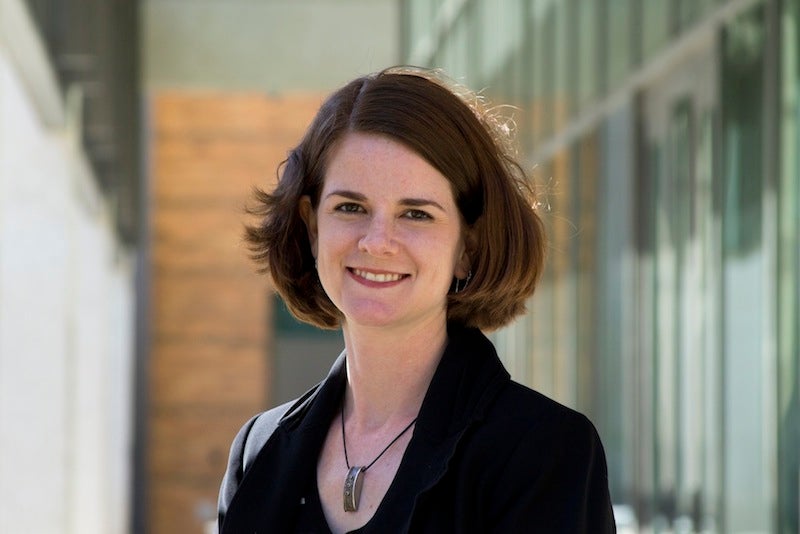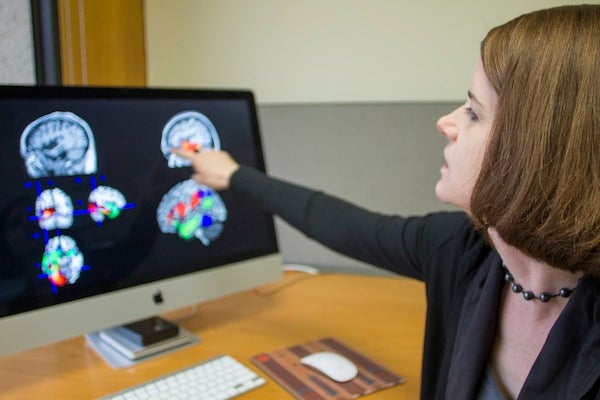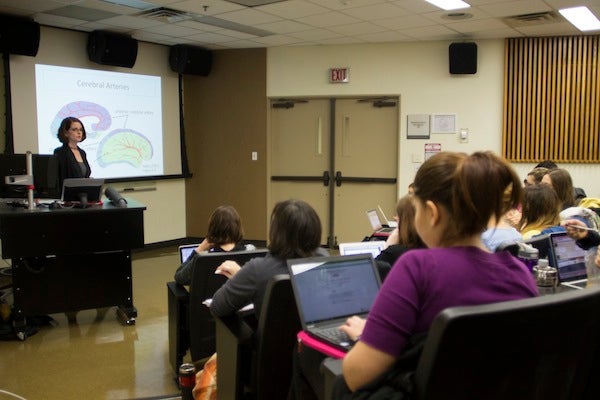Rehabilitating Speech and Language

Maya L. Henry (B.A. Linguistics ’99) got her first glimpse of how exciting the field of speech-language pathology could be in Professor Harvey Sussman’s language and the brain course, where she observed a man who’d experienced a stroke attempt to communicate.

“I was immediately fascinated,” said Henry. “I had always been interested in linguistics and cognitive science, but wanted to do something with a real human impact—speech-language pathology was a natural fit.”
Henry went on to earn her doctorate in speech-language pathology from the University of Arizona in 2009 and completed a postdoctoral fellowship at UC San Francisco. In returning to her alma mater, Henry joins the Department of Communication Sciences and Disorders as an assistant professor and newest faculty member for the 2013-2014 academic year. She is Director of the Aphasia Research and Treatment Lab (ARTlab).
Henry teaches courses on aphasia, a loss of the ability to produce or comprehend spoken or written language due to disease or injury to the brain, and related neurogenic communication disorders.
We caught up with Henry for a question and answer session to learn what she has planned for 2014.
1) As an alumna of UT Austin, what inspired you to return?
The CSD department here has a great reputation and UT Austin is a really strong research institution with an impressive and growing neuroimaging program. Also, the new Dell Medical School was definitely a draw. I will always collaborate with neurologists, so it’s great that there will be a built-in mechanism to do so. Finally, I have to say that I missed Texas and my family and friends who live here. Coming back to Austin feels like coming home.
2) What advice do you have for students pursuing a career in the treatment of aphasia and related neurogenic communication disorders?
I tell students that working with neurogenic disorders of communication is always challenging, always interesting, and incredibly rewarding. Learning about these disorders, you get to take on everything from neuroanatomy to counseling. If you're interested in language and the brain and want to help people, this is the career for you.
3) Are there any new breakthroughs or changes in best practices occurring in the field?

Yes, many. I guess the direction that I find most fascinating is the use of neuroimaging (e.g., MRI scanning) to examine how speech-language treatment affects our neural circuitry. New imaging technology has given us a window into not only what works in terms of speech-language treatment, but also how and why treatment works. It's very exciting to see just how “plastic” our brains can be, capable of reorganizing and rewiring even later in life.
4) On the clinical side, what are the most challenging aspects of treating aphasia and related neurogenic disorders?
The challenge is also what brings the fascination—the unpredictability and variability of human behavior. Being a clinician will never be boring for me, as people are endlessly interesting. When you walk into a clinical setting, you just never know what you’ll find. On a sadder note, working with medically fragile patients means that sometimes you lose people who you’ve grown very close to. I’ve learned to appreciate being healthy and to never take people for granted.
5) On the research side, what specific areas do you plan to pursue?
I plan to continue my work looking at treatment for speech and language difficulties caused by stroke and degenerative disease. We still have a lot to learn about the types of treatment that may maximally benefit our patients and the ways in which we can ensure that the effects of treatment are as potent and lasting as possible. In particular, I’m interested in comparing how certain approaches benefit different populations, what the long-term effects of treatment are, and whether dose modifications can result in stronger, longer-lasting effects of therapy. In conjunction, I will use neuroimaging to examine neural predictors of response to treatment (how the integrity of certain brain structures affects outcomes) and brain-behavior relations for language and speech more broadly.

The most exciting news for my new lab here at UT is that we've been awarded an NIH research grant for a study titled "Rehabilitation of Speech and Language in Primary Progressive Aphasia (PPA)." The three-year study will be in collaboration with Dr. Marilu Gorno-Tempini at the Memory and Aging Center at UC San Francisco. It will allow us to systematically explore tailored speech and language treatments for people suffering from this rare disorder (PPA) that causes a slow decline in the ability to communicate, sometimes in people as young as their 50s. It's a devastating condition that has not received enough attention. Currently, patients are often not even seen by a speech-language pathologist. We hope to change that with evidence that therapy can really improve these peoples’ lives and is worth pursuing.
